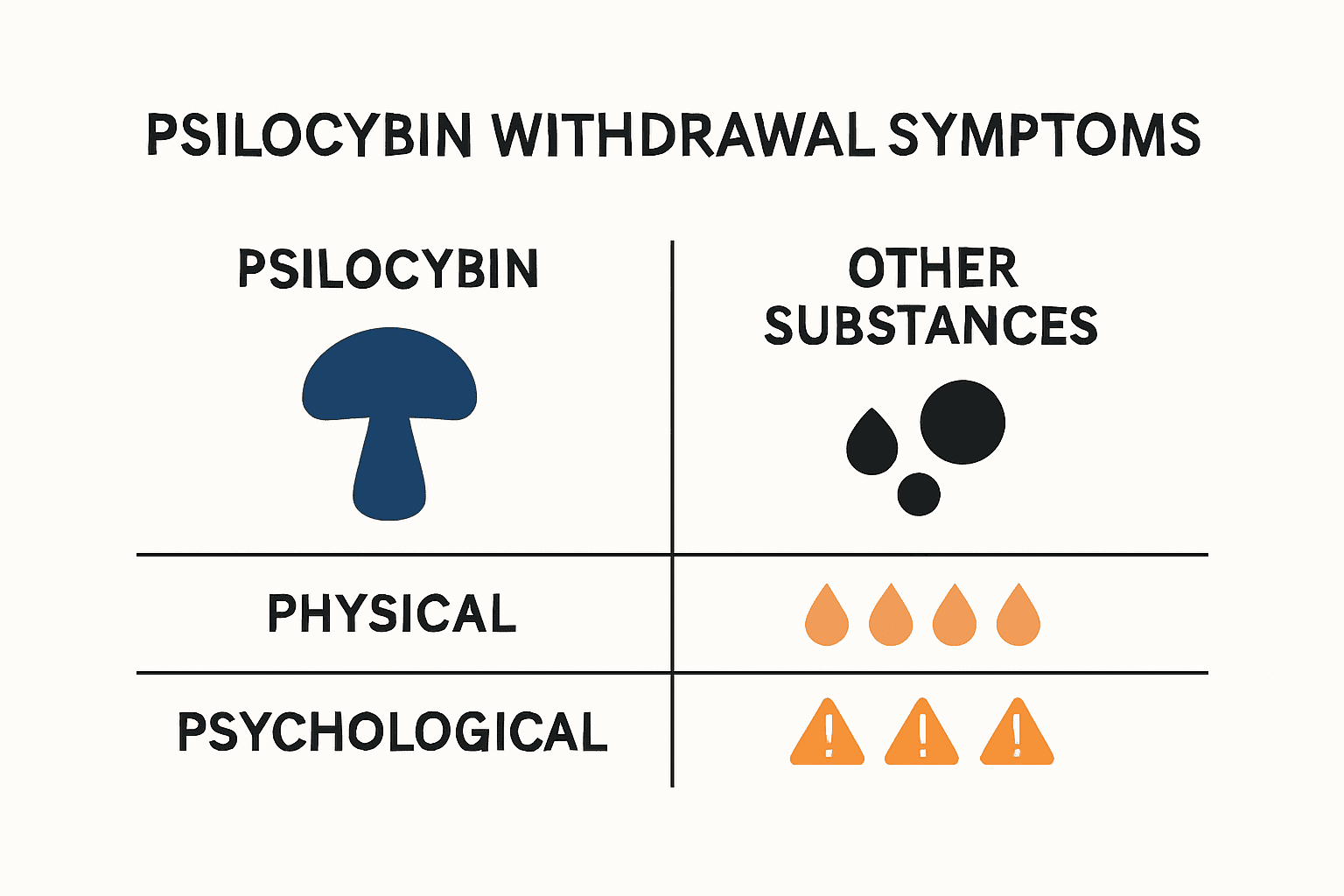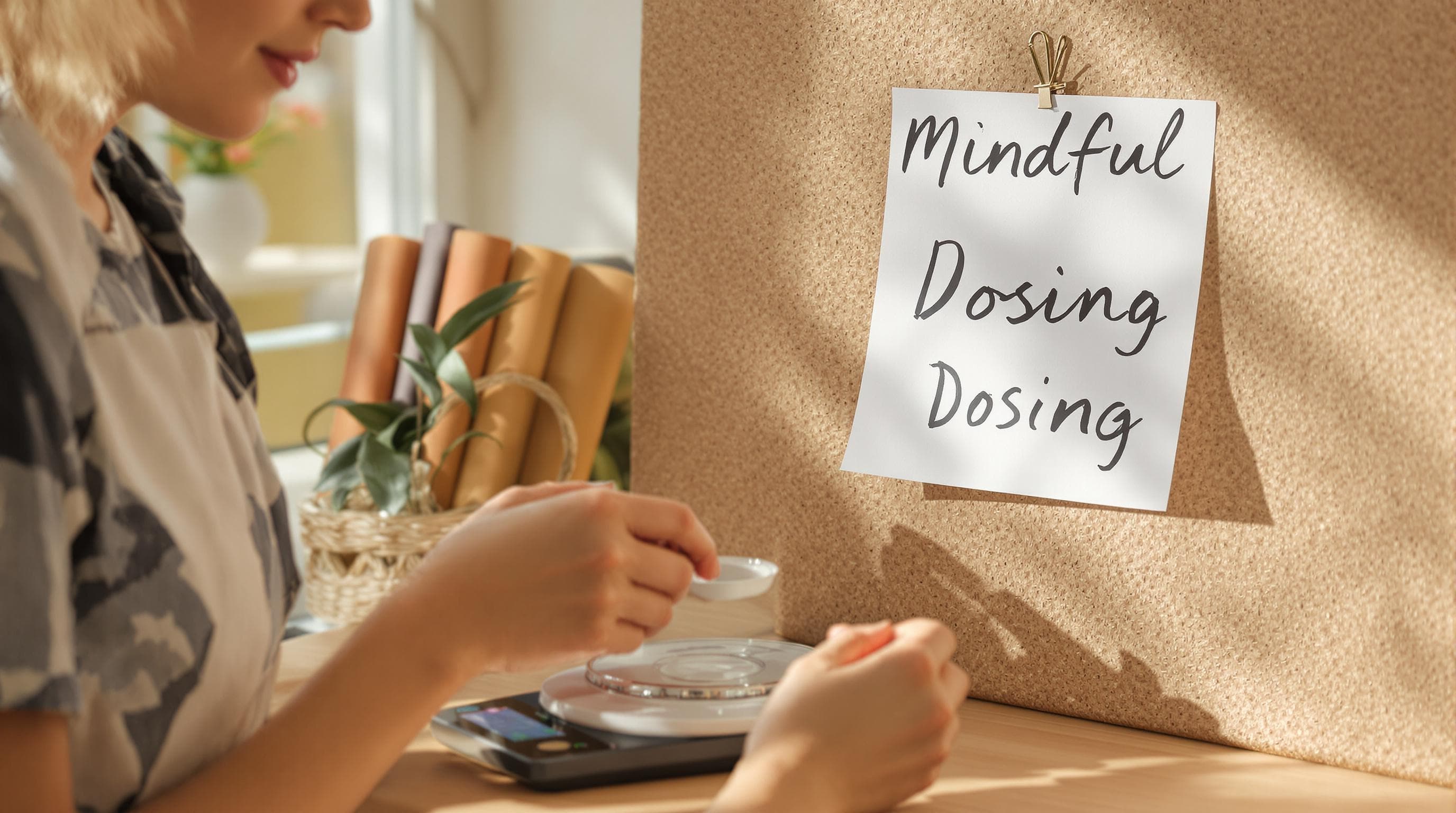Psilocybin is often called one of the safest psychoactive substances around. Unlike alcohol or opioids, research shows that psilocybin has virtually zero risk of physical dependence or severe withdrawal symptoms. Most people expect dramatic side effects when stopping any mind-altering substance. The surprise is that quitting psilocybin usually brings little more than a few gentle mood changes, and sometimes none at all. That flips a lot of what we think we know about withdrawal completely upside down.
Table of Contents
- Understanding Psilocybin Withdrawal Symptoms
- How Microdosing Impacts Withdrawal Effects
- Managing Symptoms For Wellness And Recovery
- Legal And Safe Access To Psilocybin In Canada
Quick Summary
| Takeaway | Explanation |
|---|---|
| Psilocybin shows low addiction potential | Psilocybin does not create typical physiological dependence, leading to unique withdrawal experiences compared to traditional substances. |
| Mild psychological adjustments occur post-use | Discontinuing psilocybin may result in subtle mood fluctuations or cognitive changes, typically not severe. |
| Microdosing reduces withdrawal risks | Controlled, sub-perceptual dosing of psilocybin can minimize abrupt psychological disturbances during discontinuation. |
| Holistic practices support psychological wellness | Techniques like mindfulness, exercise, and proper nutrition can mitigate any psychological shifts after psilocybin use. |
| Professional support is essential | Consulting with trained professionals can help manage psychological transitions and ensure a safer psilocybin experience. |
Understanding Psilocybin Withdrawal Symptoms
Psilocybin, the primary psychoactive compound found in magic mushrooms, presents a unique profile when it comes to withdrawal symptoms. Research from the National Institute on Drug Abuse reveals that psilocybin has remarkably low potential for physical dependence, challenging many traditional assumptions about psychoactive substances.

The Complex Nature of Psilocybin Dependency
Contrary to many recreational drugs, psilocybin does not create a typical physiological addiction mechanism. Scientific studies published in PubMed suggest that while users might experience psychological attachment, the substance does not produce the same neurochemical dependency seen in substances like opioids or alcohol. This means the withdrawal experience differs significantly from what most people understand as traditional substance withdrawal.
When individuals discontinue psilocybin use, they may encounter subtle psychological adjustments rather than intense physical withdrawal symptoms. These adjustments can include temporary changes in mood, cognitive processing, and emotional regulation. Some users report mild psychological discomfort, such as reduced mental clarity or transient mood fluctuations, but these are not classified as severe withdrawal symptoms.
Here’s a table summarizing the typical differences between withdrawal from psilocybin and traditional addictive substances as described in the article:
| Feature | Psilocybin | Traditional Substances (e.g. Opioids, Alcohol) |
|---|---|---|
| Physical Dependence | None/Minimal | High |
| Withdrawal Symptom Severity | Mild or None | Moderate to Severe |
| Symptom Nature | Psychological adjustments | Physical and psychological |
| Neurochemical Dependency | Absent | Present |
| Typical Symptom Duration | Very short/transient | Prolonged/Intense |
| Risk of Relapse from Withdrawal | Low | High |
Psychological Readjustment After Psilocybin Use
The psychological readjustment process following psilocybin use is nuanced and highly individualized. Users might experience a range of experiences, from minimal disruption to more noticeable mental recalibration. Some individuals report a temporary sense of disconnection or altered perceptual patterns as their brain chemistry returns to its baseline state.
Interestingly, these potential psychological shifts are not universally experienced. Many users report smooth transitions when discontinuing psilocybin, especially those who have approached its use intentionally and with careful microdosing protocols. For those seeking additional guidance on responsible usage, our comprehensive microdosing schedule guide offers detailed insights into minimizing potential psychological variations.
Research consistently demonstrates that psilocybin’s unique neurological interaction means traditional withdrawal models do not apply. Unlike substances that create immediate, intense physical dependency, psilocybin’s effects are more subtle and psychologically oriented. Users are more likely to experience a gentle psychological recalibration than a severe, disruptive withdrawal process.
For individuals concerned about potential psychological changes, professional consultation and a mindful, structured approach to discontinuation are recommended. Understanding that each person’s experience is unique and that mild psychological adjustments are normal can help manage expectations and support a smooth transition.
The emerging scientific consensus suggests that psilocybin’s low addiction potential and minimal withdrawal symptoms make it a fascinating subject in psychoactive compound research. As our understanding continues to evolve, ongoing studies will provide even more nuanced insights into its complex neurological interactions.
How Microdosing Impacts Withdrawal Effects
Microdosing psilocybin introduces a nuanced approach to psychedelic consumption that significantly influences potential withdrawal experiences. A systematic review published in 2025 analyzing 31 studies revealed that side effects from microdosing are typically dose-dependent, mild, and short-lived, offering crucial insights into how controlled, minimal dosages might mitigate withdrawal-related concerns.
Psychological and Physiological Microdosing Dynamics
Unlike traditional high-dose psychedelic experiences, microdosing represents a strategic method of substance interaction that potentially minimizes abrupt neurochemical disruptions. Research surveying 1,116 individuals who microdosed psychedelics found that approximately 20% reported negative effects, primarily psychological, such as increased anxiety and mood fluctuations. These findings suggest that microdosing introduces a more controlled method of engagement with psilocybin.
The controlled nature of microdosing means that users typically consume sub-perceptual doses, which do not produce full psychedelic experiences. This approach potentially reduces the likelihood of significant withdrawal symptoms by maintaining a more stable neurological environment. For individuals interested in understanding optimal microdosing protocols, our comprehensive microdosing schedule guide provides detailed insights into responsible consumption strategies.
Neurological Adaptation and Individual Variability
A groundbreaking 2019 study developed a comprehensive codebook examining microdosing benefits and challenges based on reports from 278 microdosers. While many participants reported positive outcomes like improved mood and focus, the research highlighted individual variability in physiological responses. Approximately 18% reported physiological discomfort, and 6.7% experienced increased anxiety, underscoring the importance of personalized approach and careful monitoring.
The potential for withdrawal effects varies significantly among individuals. Factors such as metabolic rate, psychological predisposition, dosage consistency, and overall mental health play crucial roles in determining how one might experience psychological readjustment after discontinuing microdosing. Some individuals might experience minimal transition effects, while others could encounter more noticeable psychological shifts.
Neurologically, microdosing appears to interact with the brain’s serotonin receptors in a more subtle manner compared to traditional psychedelic consumption. This gentler interaction suggests that withdrawal symptoms, if experienced, are likely to be less intense and more manageable. The gradual, controlled approach of microdosing allows for a more measured neurological adaptation, potentially reducing the likelihood of abrupt psychological disruptions.
Professional guidance remains essential for individuals considering microdosing or contemplating discontinuation. While current research indicates low risks of significant withdrawal symptoms, individual experiences can vary. Consulting healthcare professionals who understand psychedelic research can provide personalized insights and support throughout the process.
As scientific understanding continues to evolve, ongoing research will provide more nuanced insights into the long-term effects of microdosing and its potential impact on neurological adaptation. The emerging data suggests that responsible, informed approaches to microdosing can minimize potential withdrawal-related concerns and support a balanced, mindful interaction with psilocybin.

Managing Symptoms for Wellness and Recovery
Research from the National Institute on Drug Abuse confirms that psilocybin presents a unique profile in substance interaction, with minimal addiction potential and virtually no traditional withdrawal symptoms. This understanding provides a critical foundation for individuals seeking to manage their psychological experience and support overall wellness during and after psilocybin use.
Holistic Approaches to Psychological Integration
Managing potential psychological shifts requires a comprehensive, mindful approach. A systematic review published in 2025 highlighted that psilocybin-assisted psychotherapy demonstrates significant potential in supporting mental health transitions, particularly in addressing substance use disorders. The research suggests that integrated therapeutic approaches can help individuals navigate subtle psychological adjustments with greater ease and understanding.
Key strategies for psychological wellness include maintaining consistent sleep patterns, practicing mindfulness meditation, engaging in regular physical exercise, and maintaining a balanced nutritional diet. These holistic practices support neurological stability and emotional regulation, potentially minimizing any psychological fluctuations associated with discontinuing psilocybin use.
Below is a table summarizing holistic strategies discussed for managing psychological transitions after psilocybin use:
| Wellness Strategy | Purpose/Benefit |
|---|---|
| Consistent Sleep Patterns | Supports neurological stability and mood regulation |
| Mindfulness Meditation | Increases self-awareness and emotional balance |
| Regular Physical Exercise | Enhances mental well-being, reduces stress |
| Balanced Nutritional Diet | Supports brain health and overall mood |
| Professional Guidance | Provides personalized approaches and safety assurance |
| Support Networks | Emotional support and perspective during transitions |
| Personal Monitoring (Journaling) | Tracks mood and cognitive patterns for self-awareness |
Professional Support and Personal Monitoring
Individuals experiencing any psychological discomfort should prioritize professional guidance. Emerging research on substance use disorders indicates that personalized therapeutic interventions can effectively support individuals through potential mental health transitions. Mental health professionals trained in psychedelic integration can provide tailored strategies for managing subtle psychological changes.
Personal monitoring involves maintaining a detailed journal to track mood, cognitive function, and overall well-being. This self-reflective practice allows individuals to identify any patterns or changes, enabling proactive management of their psychological state. For those seeking structured guidance on responsible usage, our comprehensive wellness approach to microdosing offers additional insights into maintaining mental equilibrium.
It is crucial to understand that while psilocybin demonstrates remarkable safety profiles, individual experiences can vary. Factors such as personal mental health history, current psychological state, dosage patterns, and overall lifestyle significantly influence one’s experience. Approaching psilocybin use with intentionality, respect, and professional guidance maximizes potential wellness benefits while minimizing potential psychological disruptions.
Emotional support networks play a vital role in managing potential psychological adjustments. Engaging with understanding friends, participating in support groups, or working with integration therapists can provide valuable perspectives and coping strategies. These support systems help individuals process their experiences, normalize any subtle psychological shifts, and maintain a sense of psychological balance.
As scientific understanding continues to evolve, the approach to psilocybin use is becoming increasingly nuanced and wellness-oriented. The emerging consensus emphasizes individual variability, personalized approaches, and a holistic understanding of psychological integration. By combining professional guidance, self-awareness, and comprehensive wellness strategies, individuals can navigate their psilocybin experience with confidence and mindfulness.
Legal and Safe Access to Psilocybin in Canada
Navigating the legal landscape of psilocybin in Canada requires careful understanding of evolving regulations and medical frameworks. Health Canada’s current guidelines provide a nuanced approach to accessing psilocybin, focusing on therapeutic and research contexts while maintaining strict regulatory oversight.
Medical and Therapeutic Access Pathways
Canada has developed progressive pathways for legal psilocybin access, primarily through medical and research channels. Individuals seeking psilocybin for therapeutic purposes can access the substance through specialized medical programs, including compassionate access routes and clinical research studies. For comprehensive details on current legal frameworks, individuals are encouraged to explore the most up-to-date regulatory guidance.
The Special Access Program (SAP) offers a critical mechanism for patients with serious or life-threatening conditions to access psilocybin when traditional treatments have proven ineffective. Healthcare practitioners can submit requests on behalf of patients, demonstrating the medical necessity and potential therapeutic benefits of psilocybin treatment.
Regulatory Considerations and Safety Protocols
Safety remains paramount in the legal framework surrounding psilocybin access. Approved access typically requires comprehensive medical assessment, detailed patient history evaluation, and ongoing professional monitoring. Practitioners must demonstrate a thorough understanding of potential risks, therapeutic protocols, and patient suitability for psilocybin-assisted treatments.
Individuals interested in exploring psilocybin must work closely with licensed healthcare professionals who can navigate the complex regulatory landscape. This approach ensures not only legal compliance but also maximizes potential therapeutic benefits while minimizing potential risks. Our microdosing schedule guide provides additional insights into responsible and informed usage.
Recent legal developments indicate a growing recognition of psilocybin’s potential therapeutic applications. Research institutions and medical facilities are increasingly obtaining permissions for controlled studies exploring the substance’s potential in treating mental health conditions, addiction, and neurological disorders. These advances suggest a progressive approach to understanding and potentially integrating psilocybin into mainstream medical treatments.
Patients should be aware that legal access does not guarantee automatic approval. Each case undergoes rigorous individual assessment, considering factors such as medical history, current health status, potential interactions with existing treatments, and specific therapeutic objectives. This personalized approach ensures that psilocybin is accessed responsibly and with appropriate medical supervision.
The landscape of psilocybin regulation continues to evolve rapidly. Ongoing research, changing medical perspectives, and emerging clinical evidence contribute to a dynamic regulatory environment. Individuals interested in exploring psilocybin for therapeutic purposes must stay informed about the latest legal and medical guidelines.
As scientific understanding deepens and societal perspectives shift, Canada remains at the forefront of progressive approaches to psychedelic medicine. The current regulatory framework balances patient access, medical innovation, and stringent safety protocols, providing a model for responsible exploration of psilocybin’s potential therapeutic applications.
Frequently Asked Questions
What are the withdrawal symptoms of psilocybin?
Psilocybin typically does not produce severe withdrawal symptoms. Users may experience mild psychological adjustments, such as subtle mood changes or cognitive shifts, rather than intense physical withdrawal symptoms.
Is psilocybin addictive?
Research indicates that psilocybin has low addiction potential. Unlike traditional substances, it does not create physiological dependence, making withdrawal experiences unique and generally mild.
How does microdosing affect withdrawal from psilocybin?
Microdosing may minimize the risk of withdrawal symptoms by maintaining a stable neurological environment. Users report fewer abrupt psychological disturbances when they follow controlled, sub-perceptual dosing schedules.
What strategies can help manage psychological changes after stopping psilocybin?
Holistic approaches such as maintaining consistent sleep patterns, practicing mindfulness, exercising regularly, and seeking professional guidance can support psychological wellness during the transition off psilocybin.
Experience a Smoother Transition with Guided Psilocybin Microdosing
If you are concerned about subtle psychological shifts or the uncertainty of psilocybin withdrawal, you are not alone. This article highlights the unique challenge of achieving emotional stability and mental clarity when coming off psilocybin, especially if you want to avoid unpleasant mood swings. You may be searching for a solution that focuses on gentle transitions and personalized support rather than the risks seen with traditional withdrawal.

Start your journey toward balanced wellness today. Kind Stranger offers carefully crafted microdosed psilocybin capsules and gummies designed for easy dosing, sustained emotional balance, and fewer psychological disruptions. Visit Kind Stranger to discover our safe, informative resources and explore our detailed microdosing schedule guide to manage your experience with confidence. Take a proactive step now and join a supportive community that prioritizes harm reduction and wellness. Your path to clarity and calm starts at Kind Stranger.
Recommended
- Psilocybin Side Effects: What Wellness Seekers Need to Know 2025 • KIND STRANGER
- Psilocybin for Social Anxiety: Natural Relief in 2025 • KIND STRANGER
- Psilocybin Microdosing Schedule Guide 2025: Safe and Effective Plans • KIND STRANGER
- Psilocybin Legality Canada 2025: What You Need To Know • KIND STRANGER


Comments
There are no comments yet.